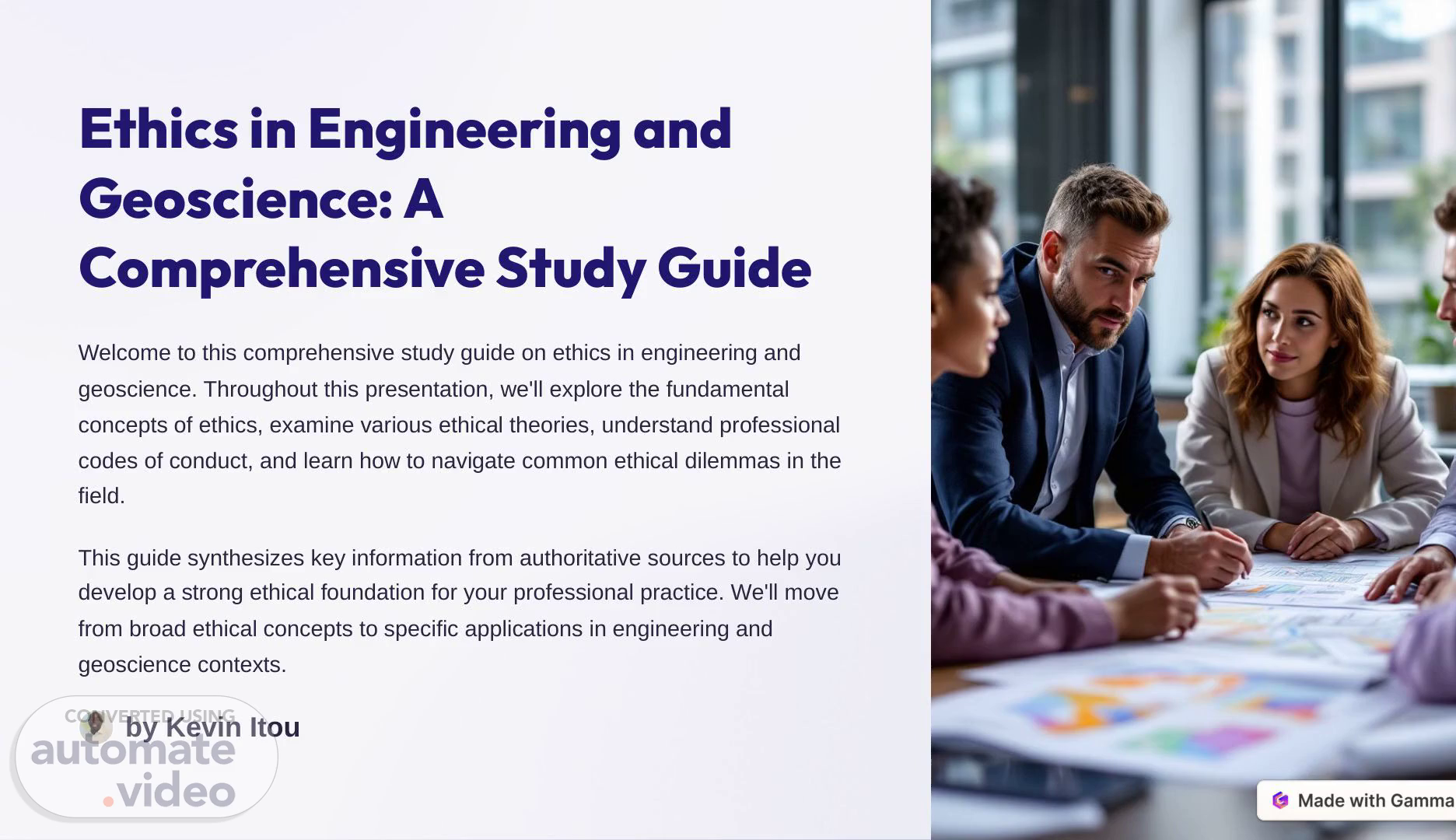
Ethics-in-Engineering-and-Geoscience-A-Comprehensive-Study-Guide
Scene 1 (0s)
[Audio] Ethics in Engineering and Geoscience: A Comprehensive Study Guide Welcome to this comprehensive study guide on ethics in engineering and geoscience. Throughout this presentation, we'll explore the fundamental concepts of ethics, examine various ethical theories, understand professional codes of conduct, and learn how to navigate common ethical dilemmas in the field. This guide synthesizes key information from authoritative sources to help you develop a strong ethical foundation for your professional practice. We'll move from broad ethical concepts to specific applications in engineering and geoscience contexts. by Kevin Itou.
Scene 2 (42s)
[Audio] The Role of Ethics in Society 1 Defining Ethics 2 Cultural Influences Ethics is the study of morality, Ethical standards are helping us discern right from established by societies and wrong. It encompasses form the basis of laws. obligations, rights, justice, and Cultural norms and customs social ideals that guide our significantly influence what's conduct, promote fairness, considered ethical behavior, and ensure accountability in creating nuances society. professionals must navigate with sensitivity. 3 Real-World Application Consider a Canadian firm navigating foreign hiring customs while maintaining non-discrimination principles. This illustrates how professionals must balance universal ethical principles with cultural sensitivity (Samuels & Sanders, 2007)..
Scene 3 (1m 40s)
[Audio] Ethical Theories and Principles Utilitarianism Rights Ethics Virtue Ethics Duty Ethics (Deontology) Focuses on maximizing Centers on protecting Focuses on developing good overall happiness and the Emphasizes adherence to individual rights. Example: character and virtues. moral duties regardless of greatest good for the Ensuring all workers have a Example: An engineer consequences. Example: An greatest number. Example: safe working environment demonstrating honesty and engineer refusing to falsify Evaluating dam construction regardless of cost integrity in all professional that displaces a community data despite pressure from implications (Haldane, 2003). interactions (Haldane, 2003). but benefits many others superiors (Haldane, 2003). (Haldane, 2003)..
Scene 4 (2m 47s)
[Audio] Applying Ethical Theories in Practice Apply Ethical Frameworks Identify the Situation Consider multiple perspectives 2 Recognize the ethical dimensions of the 1 problem Evaluate Alternatives Assess potential outcomes 3 5 Reflect on Outcomes Make a Decision Learn from the experience 4 Choose the most ethically sound option Consider an engineer choosing materials for a project. From a utilitarian perspective, they might select the most cost-effective option benefiting the most people. From a duty ethics standpoint, they would prioritize safety regardless of cost (Andrews, 2004). These ethical theories provide frameworks that help professionals analyze situations from multiple angles and evaluate potential actions more thoroughly..
Scene 5 (3m 37s)
[Audio] Codes of Ethics for Professional Engineers and Geoscientists 1 Integrity Honesty in all professional matters 2 Competence Working within areas of expertise 3 Public Interest Prioritizing societal welfare 4 Public Safety Paramount consideration in all work Professional codes of ethics are derived from provincial and territorial acts (Marston, n.d.) and establish mandatory standards of conduct. Engineers Canada (2001) emphasizes that these codes aren't merely suggestions4violations can result in disciplinary action (APEGGA, 2003). These codes provide a framework for ethical decision-making in complex situations, such as when an engineer must prioritize environmental protection over client demands..
Scene 6 (4m 28s)
[Audio] Common Ethical Issues and Dilemmas Conflict of Interest Confidentiality Whistleblowing Occurs when personal interests Balancing client privacy with public Reporting unethical or illegal activities. interfere with professional judgment. interest. Example: An engineer Example: An engineer reporting a Example: An engineer having a knowing confidential information that supervisor's data falsification (NSPE, financial stake in a project they're could affect public safety (NSPE, n.d.). n.d.). Often involves weighing loyalty evaluating (Johnson, 1996). Requires Professionals must determine when against professional integrity and disclosure and sometimes recusal disclosure is ethically necessary. public safety. from decision-making..
Scene 7 (5m 21s)
[Audio] Ethical Decision-Making Framework Gather Information Collect all relevant facts and identify stakeholders. Consider both technical details and human factors that might 1 influence the situation. Identify Ethical Issues Determine which ethical principles are at stake. Recognize conflicts between different ethical considerations such as 2 confidentiality versus public safety. 3 Generate Alternatives Develop multiple possible courses of action. Consider approaches that might balance competing ethical demands. 4 Evaluate Options Assess each alternative using ethical theories. Consider short and long-term consequences for all stakeholders. 5 Decide and Implement Choose the most ethically sound option and act on it with integrity (Srinivasan, 2007)..
Scene 8 (6m 13s)
[Audio] Real-Life Ethical Case Studies Safety vs. Cost Pressures Community Impact Assessment Environmental Consultant's Dilemma An engineer faces pressure to approve a A geoscientist must evaluate the An environmental consultant discovers design they believe may have safety environmental impact of a mining project potential contamination while working for a issues. This demonstrates the challenge on local communities, balancing economic client. They must balance client of maintaining professional integrity when benefits against potential harm to confidentiality against public health facing economic or timeline pressures indigenous lands and traditions. concerns, illustrating the complex interplay (Engineers Canada, 2001). between professional obligations (APEGGA, 2003)..
Scene 9 (7m 7s)
[Audio] Maintaining Ethical Practice Throughout Your Career Seek Mentorship Regular SelfAssessment Contribute to Professional Community Continuous Learning Develop relationships with Periodically evaluate your own Participate in developing and Stay current with evolving experienced professionals who ethical decision-making and refining ethical standards ethical standards and technical demonstrate strong ethical practices. Reflect on past within your professional knowledge through ongoing leadership. Regular decisions and consider how organizations. Share professional development. discussions about ethical you might improve your experiences and insights to Attend workshops, courses, challenges can provide approach to future ethical help advance ethical practice and industry events focused valuable guidance for dilemmas. in your field. on ethics (Engineers Canada, navigating complex situations. 2004). Remember that ethical practice is not a destination but a journey requiring ongoing commitment and growth throughout your career..